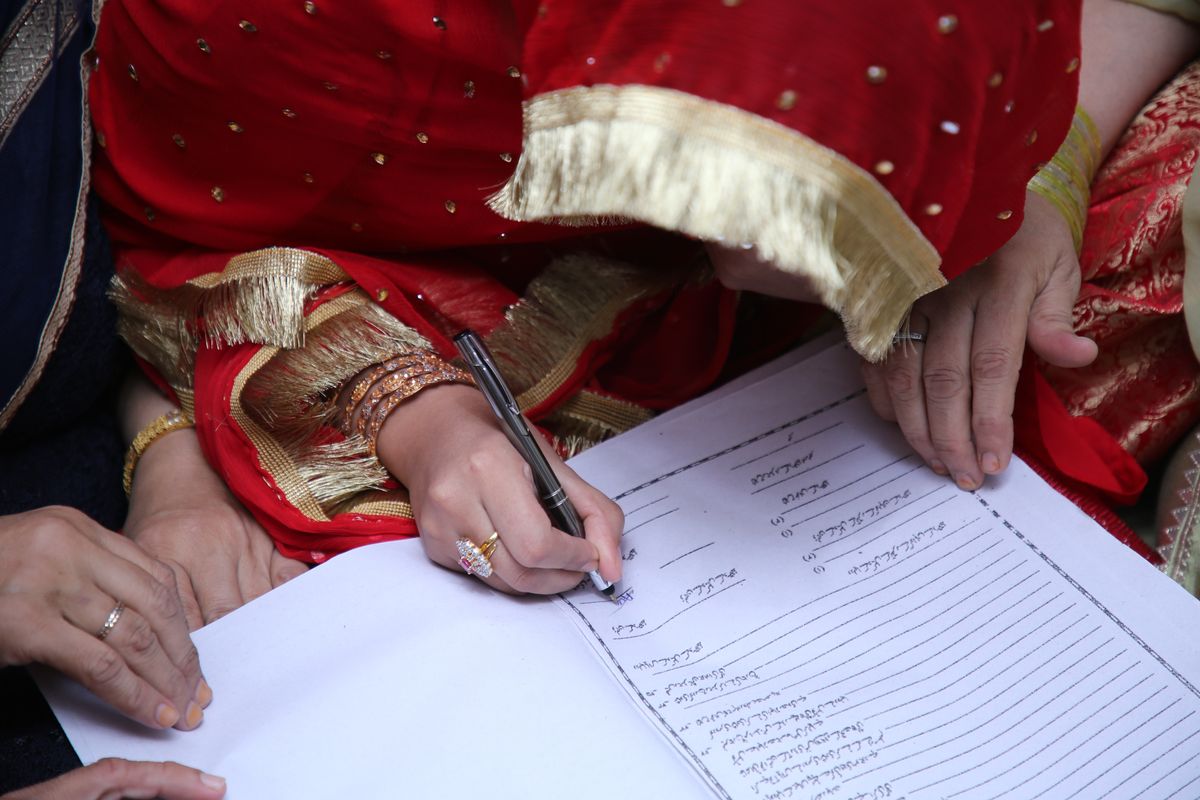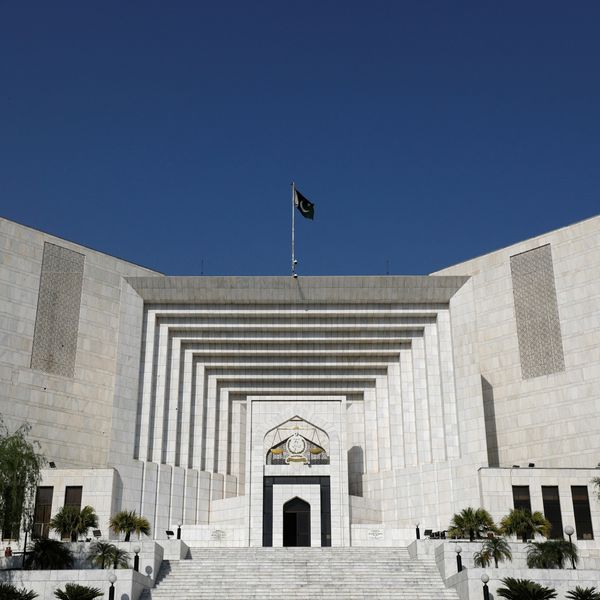Guardians of consent: Pakistan’s courts hold husbands accountable for unlawful second marriages
In recent years, Pakistan’s judiciary is sending a strong message to those who overlook the consent of their wives in pursuit of a second marriage

Zain Ul Abideen
Senior Producer
Zain Ul Abideen is an experienced digital journalist with over 12 years in the media industry, having held key editorial positions at top news organizations in Pakistan.

Pakistani Muslim bridal signs wedding contract Karachi, Pakistan, 01 August 2020
Shutterstock
Lawyer says MFLO established with aim of modernizing family laws and fostering pro-women legal framework
While law focuses on procedural aspects of divorce, it doesn't reflect evolving dynamics of modern couples and shifting gender roles
In a recent ruling, the Supreme Court of Pakistan (SC) declared that if a husband marries a second wife without securing permission from his first wife, the first wife holds the right to dissolve the marriage contract on that basis.
This ruling reaffirms the legal provisions outlined in Pakistan’s Muslim Family Laws Ordinance (MFLO) of 1961, which mandates that any husband intending to marry again must obtain the consent of both his first wife and the local Union Council before proceeding.
Under the MFLO, Section 6(5) addresses the requirement for such permissions. Failure to comply can lead to a range of legal consequences, including imprisonment, financial penalties, or both. The ruling reflects growing judicial enforcement of laws aimed at preventing unauthorized polygamous marriages, ensuring protections for the first wife, and maintaining legal accountability in such cases.
Recent notable judgments
In April, a local court in Peshawar convicted a man for contracting a second marriage without obtaining the required permissions from his first wife and the local council. The court sentenced him to three months in prison and imposed a PKR 5,000 fine. The presiding judge ruled that the complainant, Fatima, successfully established her case against the accused beyond any reasonable doubt, supported by what the court called “reliable and confidence-inspiring evidence.”
Fatima’s case was prosecuted under Section 6(5) of the Muslim Family Laws Ordinance, 1961, which governs the conditions under which a second marriage may legally take place.
In March, a family court in Lahore sentenced Muhammad Aurangzeb Khan to seven months in prison and ordered him to pay a substantial fine of PKR 500,000 for entering into a second marriage without the consent of his first wife, Zona Nasar.
According to the case filed by Nasar, she and Khan had married on September 24, 2011. She alleged that Khan entered into a second marriage without her knowledge or consent, a direct violation of the Muslim Family Laws Ordinance.
In his ruling, the judge stated that the accused had clearly breached the ordinance’s provisions and convicted him under Section 6(5).
In December 2023, a Christian man in Karachi, Joshua Ilyas, was convicted under the Christian Marriage Act of 1872, marking the first time the law has been enforced in this manner. Ilyas married a second time despite his first wife being alive, an action prohibited under the 1872 Act.
A local court sentenced him to nine years in prison and fined him PKR 25,000.
In February 2022, police officials in Lahore arrested a man following the Lahore High Court’s (LHC) decision to dismiss his pre-arrest bail.
The accused, Ghulam Hussain, had sought bail to avoid a six-month prison sentence and a fine of Rs500,000, penalties imposed by a family court over his second marriage, which he allegedly entered into without his first wife’s consent.
In August 2021, a Lahore magistrate sentenced a man to six months in jail for marrying a second wife without the consent of his first wife, after he failed to prove that he had divorced her prior to the second marriage.
Why was MFLO established?
Family lawyer Khushbakht Shah Jillani, while talking to Nukta, said that the MFLO was established with the aim of modernizing family laws and fostering a pro-women legal framework. However, she added that most judgments have primarily focused on procedural aspects of divorce and khula (divorce initiated by wife) without significant reflection on the evolving dynamics of modern couples and shifting gender roles since its enactment.
“Although Punjab has introduced some amendments to the procedure for pronouncing talaq and khula, the law still overlooks contemporary issues shaped by technology, social media, and global migration trends. As a result, family courts often face new questions, such as those involving online Nikkah, househusbands, and evolving maintenance requirements, yet address them with outdated interpretations,” she explained.
Moreover, she added, the Nikahnama provisions should be updated with clearer explanations on clauses like talaq-e-tafweez (delegated right of divorce), property rights, maintenance, second marriage, and emotional well-being.
When questioned about the challenges women face when seeking recourse, Khushbakht said that they encounter biases in family courts, particularly when they remarry after a divorce.
“Too often, cases are viewed through harmful stereotypes rather than through a sensitive legal lens. This bias shows up not only in final orders but also during pre-trial and reconciliation proceedings, where judges mediate on issues like Khula,” she asserted.
Khushbakht said that a multidisciplinary approach could aid judges in understanding psychological and cultural nuances, with insights from professionals such as relationship counselors, a practice that’s already common in parts of Europe, the U.K., and the U.S.
Legal avenues for women
“Women have two main legal avenues to challenge a husband’s second marriage conducted without consent,” said Barrister Sardar Umer Aslam.
“If a woman feels her husband’s second marriage violates her rights, she can seek recourse under the Dissolution of Muslim Marriages Act. She can argue that her husband violated the Muslim Family Laws Ordinance (MFLO) of 1961 by not obtaining her permission. In such cases, the court can dissolve the marriage, not as a Khula but as a direct dissolution based on the husband's breach of the law.”
Barrister Aslam further explained that once it is proven that the husband entered a second marriage without the approval of either the wife or the Arbitration Council, the MFLO comes into effect to protect the woman’s rights. “Under these provisions, a wife is entitled to claim her dowry, and the court may order immediate payment of her haq mehr (dower money). Additionally, she can seek jail time for her husband for violating the law,” he added.
In his experience, Barrister Aslam noted, women generally find legal support and protection under these laws, making it easier for them to receive justice. “Pakistan’s legal system has evolved to provide a more supportive environment for women, removing many barriers once they approach the court,” he added.
He acknowledged that while social pressures and economic dependency might present challenges, these factors lie outside the court’s influence.
“The courts have shown a growing empathy toward women in such cases, ensuring faster case resolutions and better legal protection. Social pressure may still pose hurdles, but they are not attributable to the judicial process,” Aslam concluded.







Comments
See what people are discussing